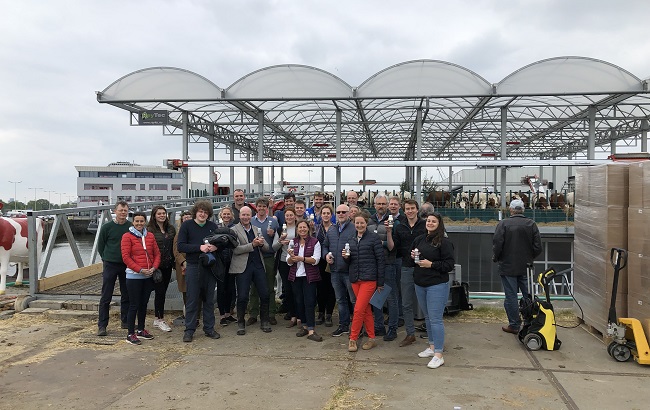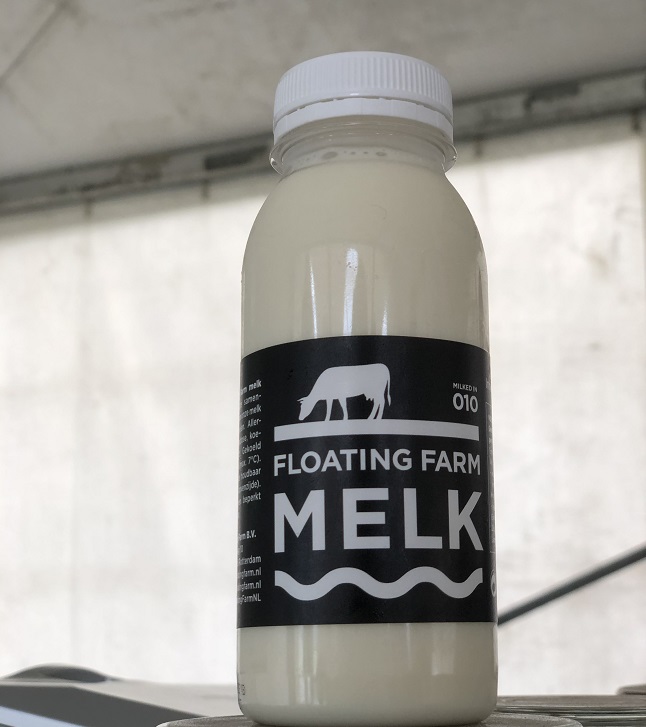Learning journey encourages participants to "think different"

In this report, the Rural Youth Project tell us about an inspiring learning journey to the Netherlands.
The Rural Youth Project and Scottish Enterprise Urban/Rural Learning Journey was a collaboration to engage participants to “think different” regarding rural enterprise, sustainability and agriculture.
Fifteen Scottish Enterprise Rural Leaders and five Rural Youth Project delegates spent five days exploring the Netherlands and learning about the collaborative and forward thinking nature of the Dutch.
The group arrived in Eindhoven on Monday 13 May bleary-eyed but with an open mind for the week ahead.
Feel Good Farming
Social enterprise, and how rural businesses are positively impacting the community, is a pillar of Dutch innovation.
De Hoge Born Care Farm is an organic fruit and vegetable nursery that offers people looking for day care or work therapy a beautiful location to relax and rediscover themselves. Tour guide, Hans Janssen, spoke about the importance of giving patients a sense of purpose and transferrable skills that can be used once the six-week live-in is complete.
From care farm to community farm, another great example of social farming was Herenboeren Community Farm working in the community supported agriculture model. Hereboeren Community Farm is a hub of 200 families (approximately 500 people) and as an organisation they rent 20 hectares of land and employ a full-time farmer. Participating families paying a once off fee of €2000 to join and a weekly contribution of about €10 per person in the household and in return the family gets a weekly portion of veg, fruit, meat and eggs.
This partnership between farmers and consumers through community farming is one that builds trust through transparency and understanding.
Finding Common Ground
The decline of rural economies isn’t a purely geographic issue, and we need urban consumers to buy into regional communities to bridge the urban/rural divide.
Innovative agricultural organisations, like sustainable chicken farm Kipster, are increasing confidence within our food chain through transparency, sustainability and resilience. Kipster creates trust through their 24hr viewing room of the chickens and this transparency around farming practices helps build trust between producer and consumer.
The urban/rural learning journey wasn’t entirely farming focussed with visits to creative agencies, such as Imargo, that are reinvigorating local villages.
Imagro’s roots lie in Ottersum, the Dutch province of North Limsburg where Roger Engelbert started up his own copywriting agency in his father-in-law’s barn. Imagro provides unique and creative workspaces for organisations and entrepreneurs to cultivate their ideas and collaborate with the local community to drive tourism and economic growth.
Roger’s creative agency, which has now grown significantly, is an example of how “cool business” can attract employees to regional areas. Imagro is creating an understanding of economies and communities and their challenges and opportunities.
Think Different

With 26% of the Netherlands landmass underwater, the Dutch have had to innovate and utilise different spaces to meet food production needs. Peter van Wingerden, saw an opportunity to transform not only the dairy industry, but the agriculture industry, when he came up with the idea of a floating dairy farm when he was in New York working on a floating housing project on the Hudson river.
As the first group to see the dairy in action, delegates were inspired and toasted to the success with a taste of the first batch of bottled milk produced on site.
Although not a wholly commercial enterprise, this proof of concept will challenge how we think about traditional agriculture infrastructure into the future.
To “think different” in business doesn’t mean we all have to start building a dairy on water. Businesses like PigMe, where pigs are farmed and lazed in fields, forests and meadows over 10 locations close to the consumer with dedicated caretakers, are not trying to reinvent the wheel. In contrast they are adapting ancient farming practices in semi-urban areas and harnessing their story to get an emotion buy-in from consumers and high-end retailers. This is a prime example of how personal/business narratives are more marketable than the product sold.
The Young & Young-at-Heart
According to the Rural Youth Project 2018 survey only 13% of young people feel they have a say in their community. The urban/rural learning journey was a group varied in age – from 25 to 60 – in different stages of their careers.
Many of the Scottish Enterprise Rural Leaders took on mentorship roles with the five Rural Youth Project delegates for professional and personal growth, and throughout the week the Rural Leaders realised that mentorship is a two-way street with valuable knowledge exchanges between both mentor/mentee. The value of this relationship will become clearer as the collaboration between Scottish Enterprise and Rural Youth Project continues but has proved a success with many to continue the relationship post event.
Learning to bridge the urban/rural divide through learning journeys to countries such as the Netherlands provides perspective to current and future change-makers about how to reinvigorate rural communities and “think different” in business.
Visit the Rural Youth Project website to find out more about the initiative.


